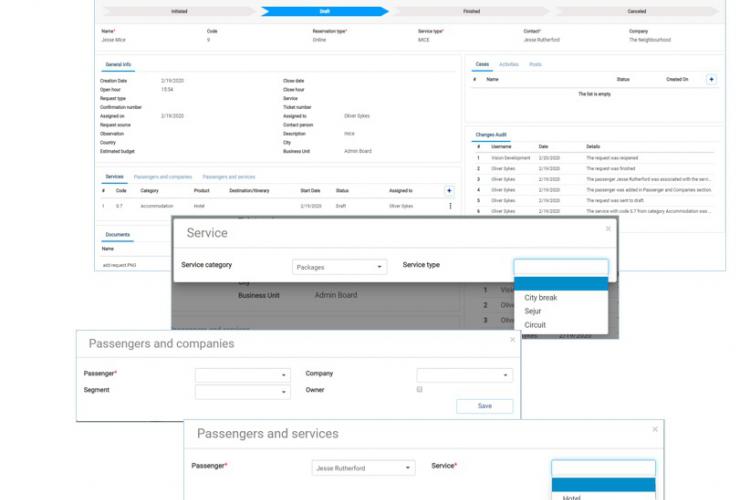Turn-key platform for Travel Agency
The platform was implemented in multiple phases, covering:
- CRM and SFA
- Operations (travel specific activities digitalisation)
- HR
- Financiar and management
The project was delivered for Aerotravel, a travel and MICE agency based in Bucharest, Romania. With growing demands for speed, personalization, and digital engagement, Aerotravel sought a complete transformation of its operations to modernize customer experiences and increase internal efficiency.
Initial Challenges
Traditional travel operations rely heavily on manual processes and disconnected tools. Aerotravel was managing bookings, payments, itineraries, and customer communication through a mix of platforms, which resulted in delays, inconsistencies, and lost business opportunities. Staff were overwhelmed with repetitive tasks, while customers experienced limited transparency and slow service. The agency struggled to maintain operational accuracy and lacked a cohesive digital strategy to attract and retain modern travelers.
Specific issues included:
- Fragmented booking, payment, and CRM systems that caused workflow disruptions
- High risk of manual errors in invoicing, itinerary updates, and vendor coordination
- Limited personalization and customer engagement due to lack of real-time tools
- No self-service options for clients to manage their own travel details
- Low visibility into business performance and difficulty tracking key metrics
These challenges created inefficiencies that slowed the business, limited growth potential, and weakened competitiveness in an increasingly digital market.
The Smart Solution
To address these problems, Aerotravel implemented a complete digitalization platform that centralized and automated its entire travel workflow. The solution integrated booking engines, payment systems, CRM, and supplier management into a single, user-friendly platform. Automation streamlined itinerary generation, invoicing, and customer communication, freeing up staff to focus on service quality and relationship management. Real-time updates and personalized messaging tools enhanced customer experience, while self-service portals gave clients more control over their travel plans. The platform also provided performance dashboards, giving leadership instant access to key data for more informed decisions.
Implementation Insights
The implementation process required a strategic blend of system integration, staff training, and workflow optimization. The first step was to map existing processes and identify bottlenecks. Once workflows were aligned, the new platform was gradually rolled out with clear onboarding and real-time support. Staff were trained to use the system’s automation features effectively, while feedback from both employees and clients helped refine the interface and communication tools. Seamless integration with vendors was critical to ensure fast confirmations and avoid delays. The result was a smooth transition to a fully digital operation that benefited both internal teams and end customers.
Results & Impact
The implementation of the digital platform delivered strong results across all core areas of the agency.
Quantitative Results:
- 40% reduction in manual workload due to automated booking, invoicing, and itinerary creation
- 50% faster response time to customer inquiries and changes
- Improved booking accuracy and better vendor coordination, reducing costly errors
- 20% increase in repeat bookings driven by improved communication and self-service features
- Real-time tracking of performance metrics, enabling faster and smarter decisions
- Enhanced digital presence and stronger brand visibility among younger, tech-savvy travelers
Qualitative Results:
- Positive user feedback on both staff and client sides
- Easy adoption supported by intuitive design and comprehensive training
- Greater operational flexibility and readiness for peak travel periods
- Elevated customer experience through personalization and self-service options
Together, these results marked a complete evolution of the agency’s operations, creating a scalable and competitive model for digital travel services.
Lessons Learned & Key Takeaways
The project revealed several important lessons for successful digital transformation in the travel sector. Mapping and optimizing workflows before automation proved essential for stability. User experience and training played a critical role in rapid adoption and platform effectiveness. Fully integrated systems enabled seamless operations but required careful management of vendor relationships and data consistency. Access to real-time insights allowed for faster, proactive decisions, while continuous feedback helped refine features and adapt to new business needs. Most importantly, offering self-service options significantly boosted customer satisfaction but required clear communication and reliable support systems. These insights confirmed that true digital success relies on a balanced approach combining technology, user experience, and continuous improvement.




